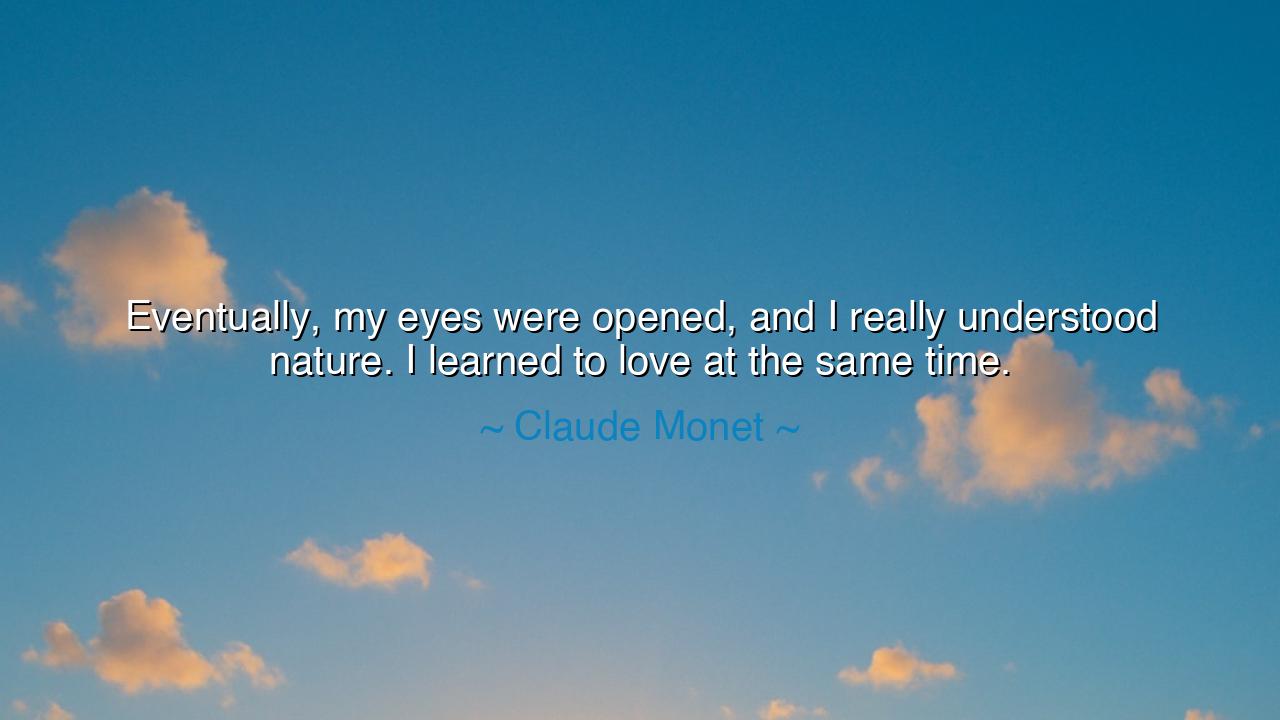
Eventually, my eyes were opened, and I really understood nature.
Eventually, my eyes were opened, and I really understood nature. I learned to love at the same time.






In the tranquil wisdom of his later years, Claude Monet, master of light and reflection, spoke these radiant words: “Eventually, my eyes were opened, and I really understood nature. I learned to love at the same time.” In this confession lies the story of an awakening — the kind that touches not just the mind, but the soul. For Monet, to see nature was not simply to observe it, but to feel it, to commune with it, to understand that beauty is not separate from love. When his eyes opened, they did not merely register color and form; they perceived the living essence of the world — and in that seeing, he discovered love itself.
Monet’s journey was not an easy one. In his youth, he painted the world as he saw it, but his sight was still bound by habit and convention. The world around him was full of critics who demanded precision and conformity, but Monet sought truth, not perfection. He longed to capture not the object itself, but the spirit of light that danced upon it — the trembling shimmer of dawn upon water, the hush of fog over the Seine, the quiet bloom of lilies drifting in stillness. Only later, when his heart softened and his patience deepened, did he begin to see that nature is not a thing to be painted — it is a presence to be loved. His art became prayer, and his brush became a vessel for reverence.
The words “my eyes were opened” carry a sacred echo, as though Monet is describing a rebirth. Many live their lives half-blind, looking but not seeing, surrounded by beauty yet numb to its voice. But for those whose eyes awaken, the world becomes holy. Every blade of grass, every shifting cloud, every ripple of water becomes a verse in the poem of existence. Monet’s revelation was not merely artistic — it was spiritual. When he learned to love nature, he also learned to love life itself. In its ever-changing light, he saw not chaos, but divine rhythm; not imperfection, but truth.
This awakening has been shared by many who walked before him. Consider Saint Francis of Assisi, who once called the sun his brother and the moon his sister. In every creature, he saw kinship, not distance — and through that vision, he found peace. Like Monet, Francis’s eyes were opened not by reason, but by love. To love is to see truly, for love strips away the veil of indifference. When Francis looked upon the earth, he did not see soil and stone — he saw life speaking, God breathing. Likewise, when Monet looked upon his garden at Giverny, it was no longer mere landscape; it was the beating heart of creation, a mirror of his own soul.
There is also a quiet paradox within Monet’s words: that understanding and love arrived together. For love, in its truest form, is born of understanding. We cannot love what we do not first see. When Monet’s eyes opened to nature, he no longer painted it as background, but as beloved. The very act of painting became communion — each stroke a gesture of tenderness, each color a prayer of gratitude. In his art, love and perception became one, and from that union emerged beauty that endures beyond time. His water lilies are not merely flowers — they are expressions of serenity, of the eternal harmony between heart and world.
For us, his words carry a profound lesson: to see is to love, and to love is to awaken. In our hurried lives, we often look without noticing, consume without cherishing, exist without feeling. But when we slow our gaze — when we allow ourselves to marvel at the sunrise, to listen to the rain, to touch the bark of a tree — we begin to understand as Monet did. The world ceases to be background noise and becomes symphony. And in that symphony, we find both humility and joy — the realization that love is not something we must seek; it is already woven into the fabric of life.
So, my dear listener, take these words of Claude Monet as both wisdom and invitation: open your eyes. Let them be cleansed by wonder, softened by gratitude. When you walk among the living earth, do not pass it by — greet it as a friend. Let the light fall upon you, and let your heart answer it. For when your eyes are truly opened, you too will find what Monet found: that to understand nature is to understand yourself, and that to love the world is the beginning of all wisdom.






AAdministratorAdministrator
Welcome, honored guests. Please leave a comment, we will respond soon